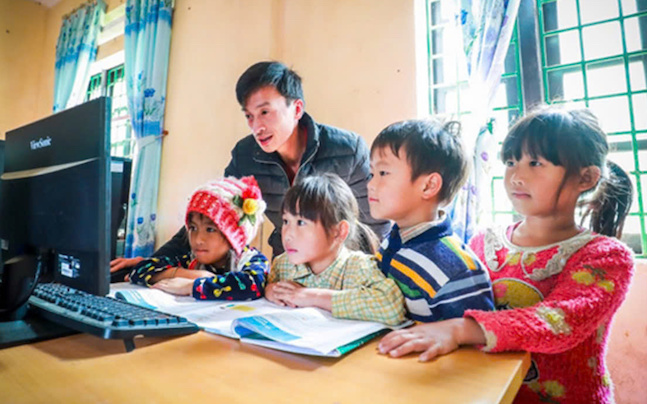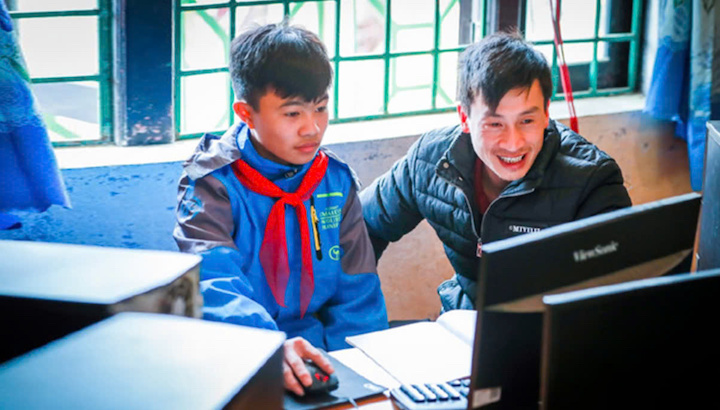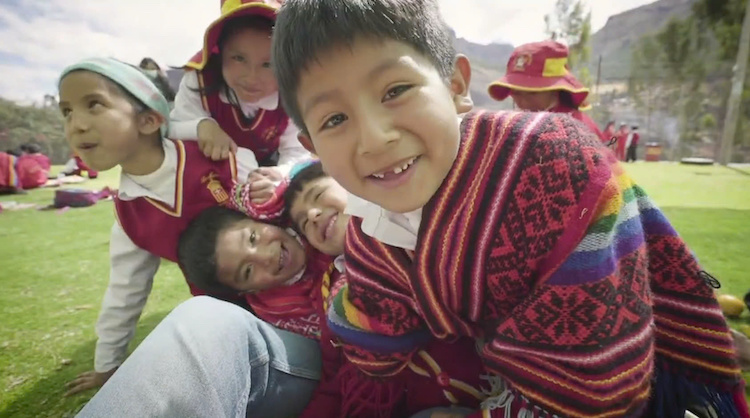During the morning class at Hoa Phuong Do Kindergarten (Phu Nhuan Commune, Bao Thang District, Lao Cai Province), the Mong and Dao children opened their eyes wide, staring intently at the pink-eared rabbit appearing on the TV screen. The animal, which had only been seen through a few static images on the pages of a book, suddenly appeared vivid and colorful.
In addition to blackboards and chalk, wifi transmitters, computers and projection screens have now become indispensable devices. In more remote schools, where fiber optic cables have not been installed, teachers can use data sims to download lessons and tests for their children. Over the past 10 years, in this northern mountainous province, not only general schools, but also kindergartens like Hoa Phuong Do, teachers and students have become familiar with using the internet in their lessons.
Behind the change in traditional teaching methods, we must mention Viettel's journey of providing free Internet to 100% of educational institutions nationwide, at all levels, so that knowledge is transmitted authentically and visually. For children in rural areas, highlands, and islands, who do not have many opportunities to access technology, this really opens up a great improvement in learning.
The latest milestone in this enduring journey is that thanks to its efforts to bridge the educational gap, Viettel was honored in the top 3 in the ranking of enterprises with important contributions to sustainable development and positive impacts on society (Top 50 Change the world 2024) by the prestigious magazine Fortune. This result affirms Viettel's leading role in the field of digital infrastructure, with innovative approaches and lasting impacts on society.
Open up new approaches to knowledge
In 2008, Viettel cooperated with the Ministry of Education and Training to implement broadband Internet connection to serve the activities of the entire sector. The groundbreaking ceremony for the Education Network Connection took place, with the aim of bringing the Internet to all stages of management, operation, research, teaching, learning... to a total of nearly 40,000 schools and local Departments of Education and Training, equivalent to 100% of the number of educational institutions in Vietnam at that time. This was considered an unprecedented program in the history of the telecommunications industry in Vietnam and in the world at that time.
After 2 years, Viettel achieved the goal of bringing Internet to every school, in accordance with its commitment on the implementation process. Since 2010, Vietnam has been among the leading ASEAN countries in terms of Internet connectivity in the education sector. Having completed the infrastructure provision, Viettel continues to upgrade the transmission lines for schools to broadband, ensuring faster and more stable access speeds, meeting the increasing learning needs.
Also located in Lao Cai province, the Nan Sin Ethnic Boarding Primary and Secondary School (Simacai District) was provided free Internet by Viettel. In 2013, it was converted from EDGE modem to 3G modem, which is capable of catching signals and increasing transmission speed. Since the installation of the network, the school's students have begun to learn English through the website or participate in online math competitions - things they had never been exposed to before. Or for the girl Mung Thi Thao in Sapa town, her ability to speak English fluently was acquired from the classes spent exploring foreign language teaching clips, listening and imitating the pronunciation, learning vocabulary, and gradually forming communication skills. During the sessions when she followed her sisters from the village to town, Thao could both chat and sell goods to tourists naturally, without language barriers.


For teachers and school administrators, the Internet has also changed their work in a positive way. The first benefit is that knowledge transmission is easier with teaching content made more vivid by images, visual clips and also expanded to other forms of transmission.
Teacher Vu Minh Tuyen (Chu Van An Secondary School, Gia Lai Province) gave an example of the English subject he is in charge of: “To compare, normally the lectures are very dry when there are only teachers and students sitting and talking to each other. With the additional support of the Internet, I have many directions to teach through games related to the subject that are referenced and filtered online. Students have more diverse ways of learning, and can find the most suitable learning method for themselves.”
For teachers working in remote areas, the journey of “carrying letters up the mountain” is significantly less arduous. Previously, if teachers wanted to attend training classes in the lowlands, they had to travel over mountain passes to get there in person. Now, with laptops, phones and stable Internet connections, groups of teachers can go online and organize specialized training and discussions remotely. Teaching information and lesson plans are also stored in document repositories and digital libraries.
Spirit for children "no borders"
Not only in Vietnam, in the countries Viettel has invested in, the school Internet project has brought many new learning opportunities to students around the world.
Before Bitel (Viettel Peru) provided support, computer and Internet facilities were still out of reach for more than 300 students at Gian Pet Nolasco Primary School (Cusco Province) – the highest area in the country. Education policy makers repeatedly called for and lobbied, but due to the rugged and remote terrain of the highlands, network operators in this South American country refused to invest in infrastructure because it was difficult to make a profit. The education of children here therefore faced many limitations.
The difficulties are even more evident during the COVID-19 period, when schools are temporarily closed and students have no other source to study on their own. Even when teachers go to places with internet access to download online lessons and visit each student’s house every month to make up for the gap in knowledge, it is still obvious.
Understanding the urgent need, the Bitel team volunteered to solve the most difficult problem, despite identifying many challenges ahead. Free Internet broadcasting stations were gradually built quickly in this rugged terrain, despite heavy rain, strong winds, and the process of transporting equipment, which sometimes could not rely on machinery, but had to be carried by hand from the foot to the top of the mountain.

Gian Pet Nolasco School is among thousands of schools in Peru in particular and other schools in general in 8 international markets that Viettel has committed to providing Internet coverage, ensuring that students in these countries have improved learning conditions.
In Cambodia, over 2,000 schools were equipped with internet and computers between 2009 and 2022. In Laos, Viettel installed free internet for 1,295 schools over 6 years from 2009 to 2015, while also building and supporting the electricity supply to schools. Or in Haiti, Viettel committed to the government to install internet for over 1,300 schools between 2011 and 2025.
During the 16 years since its inception, with the available infrastructure and technology of a large telecommunications enterprise, the trustworthiness of a military enterprise, and the motto of contributing to society, Viettel has successfully provided Internet to the education sector both domestically and internationally; creating momentum to build a huge online knowledge base, shared with all students anywhere, from the mountains to the plains.
In parallel, Viettel has also organized many information technology training programs for teachers and students in remote areas, helping to improve their skills in using online tools and making the most of educational resources on the Internet.
When learning that Viettel had succeeded in bringing the Internet to 100% of schools, Susan Schorr, a member of the Special Initiatives Committee of the International Telecommunication Union (ITU), commented: "Very impressive, I have never seen a school connectivity initiative that was completely initiated and implemented by a business with its own money."











